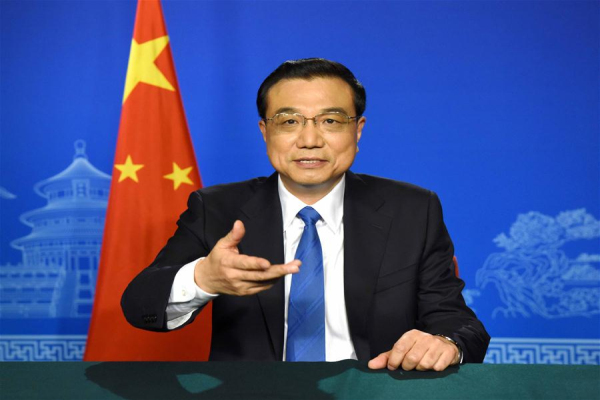 |
|
Chinese Premier Li Keqiang speaks in a video message to the G20 Finance Ministers and Central Bank Governors Meeting that opened in Shanghai, east China, Feb. 26, 2016.[Photo/Xinhua] |
Editor's note: The following is full text of a video message for the G20 Finance Ministers and Central Bank Governors Meeting delivered by Premier Li Keqiang on Feb 26.
Distinguished Representatives,
Ladies and Gentlemen,
This year is the first for China to hold the G20 presidency. It is also the first time for the G20 Finance Ministers and Central Bank Governors Meeting to be held in China. On behalf of the Chinese government, let me extend a warm welcome to you all.
We meet at a time of sluggish world economic recovery and growth. Global trade remains at a low level. Volatilities continue in the international financial market. Destabilizing factors and uncertainties are on the rise. The international community has greater expectations for the G20 to demonstrate leadership. The G20 has a role to help resolve outstanding issues and end impetus to world economic recovery and growth. This year, the G20 Summit will be held in Hangzhou. The theme will be "Towards an Innovative, Invigorated, Interconnected and Inclusive World Economy". It will serve to build consensus, promote cooperation and enable actions. I am sure the meetings on fiscal and financial sectors will contribute to the success of the Summit. I believe the following are important for the G20:
- Macroeconomic policy coordination needs to be strengthened. The global economic and financial situation may have become more grim and complex. It is time for countries to stand together to tide over difficulties. When formulating national macroeconomic policies, G20 members need to keep in mind not just their own growth. They also need to look after the spillover effects of their policies. They need to increase communication and coordination, and work together to ensure stability of the international financial market.
- Structural reforms need to be carried forward. The international financial crisis showed that quantitative easing policies could hardly remove structural obstacles to growth. They might even lead to more negative externalities. Our focus should rather remain on structural reforms. Countries face different circumstances. What is desirable is innovation, deregulation, more competition and greater openness. This way, the economy will grow more vibrant.
- Global economic and financial governance needs to be improved. The recent IMF quota reform made positive progress. We hope G20 members will continue to advance reform of international financial institutions. The international monetary system may be further improved and global taxation cooperation deepened. Working together, we could make the global economic system more fair, just and open.
Ladies and Gentlemen,
China is the largest developing country. It has contributed significantly to world economic growth along with other countries. China's GDP grew by 6.9 percent last year. That was for an economy worth over $10 trillion. The growth rate was one of the highest among major economies in the world. Positive progress has been made in structural adjustment. The service sector already accounts for over 50 percent of the GDP. Consumption is contributing much more to economic growth. One thing to highlight is the over 13 million new urban jobs, including new jobs created for the millions of college graduates. Though China's economic growth is lower than before, employment rate is steady and growing. That means our efforts in fostering new drives to growth and developing new economy are paying off.
We have the confidence to handle the complex situation at home and abroad. In the face of risks and challenges, we will not look the other way. We will tackle them head on with a holistic approach. The Chinese economy as real potential, resilience and flexibility. We will expand aggregate demand as appropriate, and focus on structural reforms. We will press ahead with supply-side structural reform, and continue to streamline administration, delegate power, enhance regulation and improve services. China's development strategy is one driven by innovation. We encourage mass entrepreneurship and innovation. We will take steps to unleash the people's enthusiasm and ingenuity as well as the market's vitality and creativity of the public. The purpose is to foster new drivers to growth an upgrade traditional growth drivers.
China will continue with market-oriented and rule-based financial reform. We will cultivate an open and transparent capital market and ensure that it enjoys long-term, steady and healthy development. We will pursue a managed floating exchange rate regime based on market demand and supply and with reference to a basket of currencies. There is no basis for continued depreciation of the RMB exchange rate. It will stay basically stable on an adaptable and equilibrium level. China's continued growth and reform and opening up provide a solid basis to support steady performance of its financial markets.
Ladies and Gentlemen,
The Chinese people have just celebrated the traditional Chinese New Year. As the saying goes, plan for the whole year starts in spring. Together, let's move forward the agenda for social and financial cooperation, and make the G20 a truely premier forum for internaitonal economic cooperation. Let's work together to promote strong, sustainable an balanced growth of the world economy.
I wish this meeting a full success. Thank you very much.